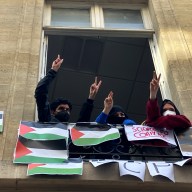KANDAHAR, Afghanistan – Bibi Shido can’t sleep at night but it has little to do with the fact her bed is nothing more than a pile of blankets on the ground of a makeshift tent in temperatures that have dipped below 10 degrees this unusually frigid winter.
The grandmother of 11 is in constant pain. In the spot where her nose once was are two upturned nostrils surrounded by a blackened heap of coagulated blood.
“There was some disease on my nose,” she explains in her native Pashto through a translator. “I don’t have any money to buy some medication. It’s always bleeding. Every night there is pain.”
Among some 2,000 squatters living in a tent ghetto in the heart of Kandahar city, the elderly woman is among an estimated 90,000 internally displaced people currently living in Kandahar province.
Though the number of IDPs, as they’re known among aid workers, has likely diminished significantly since the fall of the Taliban, the level of poverty is nonetheless striking, particularly when surrounded by the sort of development that’s shooting up not far away.
Mostly Kuchi nomads who’ve lost their heards to drought, the sprawling camp known as Shin Ghazi Baba due to its proximity to a shrine by the same name is also home to many Afghans who fled war zones across the country to head south in search of work and warmer temperatures in winter.
Others who had taken refuge in Pakistan and Iran to escape the Taliban have since returned only to find themselves caught in the middle of an ongoing battle between insurgents and Afghan and NATO forces which include Canadian troops who’ve been based in Kandahar province for the last two years.
“We have tent problems, food problems. We don’t have water sanitation, no pure drinking water, no aid for us,” tribe leader Abdul Mannan said as a group of barefoot elementary school-age children, their faces covered in dirt and noses dripping mucous, hovered around him.
Mannan said many of the young men have come to the city to find work to feed their families. The children seldom have shoes to wear let alone classrooms to learn and most residents typically survive on bread and tea.
“Before anything we need security and peace in our country,” Mannan said. “Second we need land to build our homes. This is private land and we can be kicked out at any time.”
Noting disease and premature death run rampant throughout the camp, Mannan said medical care is also crucial.
Every now and then aid groups like World Food Program (WFP) or UNICEF drop off a few staples, but even as a Blackhawk helicopter from nearby Kandahar Airfield passed overhead, Mannan insisted the community has largely been forgotten if not ignored.
Norine MacDonald of the Senlis Council agrees.
“We’ve been coming to this camp… for two years and as far as we can tell from asking people and what we see here, they have not received any help from the government, the international community or CIDA,” she said in a television interview.
“The situation of extreme poverty makes it very easy for them to be recruited by the Taliban and it also turns them against the central government.”
The international think-tank and longtime critic of the Canadian International Development Agency is recommending a massive food aid and assistance program be delivered by the military to Kandahar’s poorest citizens as the best way to win over hearts and minds.
“We’ve seen over the last few years that CIDA has been unable to deliver any substantial aid program to the people of Kandahar and there’s such extreme poverty,” MacDonald said.
“What these people need now is food for their children, they need shoes for their children, they need medical care, they need shelter.”
In a written statement from CIDA, officials said the Shin Ghazi Baba camp was among the first to receive food and non-food items in advance of winter. In fact, about 3,000 Kuchi families around Kandahar received a month’s supply of rations in November and December from WFP and UNICEF, the statement said, noting CIDA officials monitored the distribution.
But WFP spokesman Rick Corsino said what these communities really need is a long-term solution.
According to a 2005 report by WFP, the Afghan government had actually requested an end to food assistance programs in camps like Shin Ghazi Baba and a greater emphasis on training and employment.
“We cannot continue indefinitely providing handout support. It’s not a long-term possibility,” he said.
“The intention is to help them through a short period of time until they’re able to return to their home communities.”
















